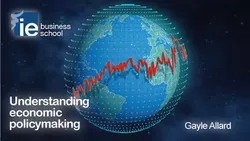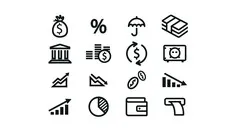
Understanding economic policymaking 
This course introduces the fundamentals of economic policymaking, providing an overview of the economic environment and the tools used to analyze and evaluate policy decisions. It is the first of three courses in the Globalization, Economic Growth and Stability Specialization. ▼
ADVERTISEMENT
Course Feature
![]() Cost:
Cost:
Free
![]() Provider:
Provider:
Coursera
![]() Certificate:
Certificate:
No Information
![]() Language:
Language:
English
![]() Start Date:
Start Date:
Self Paced
Course Overview
❗The content presented here is sourced directly from Coursera platform. For comprehensive course details, including enrollment information, simply click on the 'Go to class' link on our website.
Updated in [March 06th, 2023]
This course, Understanding Economic Policymaking, provides an overview of the tools and techniques used by governments to influence a country's economy. Students will learn how to analyze national debts and deficits, examine fiscal and monetary policy and their appropriateness to the situation of an economy, and anticipate the results of fiscal and monetary policies and structural reform on a country. Through a non-technical approach, students will gain the skills to develop their own positions in current economic debates, such as fiscal stimulus vs. austerity, the merits of quantitative easing, the need for higher interest rates or the future growth path of many modern economies. Upon completion of the course, students should be able to discuss and analyze economic policymaking in a meaningful way.
[Applications]
Upon completing this course, students should be able to apply their understanding of economic policymaking to analyze current economic debates and anticipate the results of fiscal and monetary policies and structural reform on a country. They should also be able to develop their own positions on various economic issues and use their knowledge to inform their decision-making. Additionally, students should be able to use their understanding of economic policymaking to evaluate the effectiveness of different economic policies and suggest potential solutions to economic problems.
[Career Paths]
1. Economic Policy Analyst: Economic policy analysts are responsible for researching and analyzing economic data to inform policy decisions. They must be able to interpret economic trends and develop strategies to address economic issues. They must also be able to communicate their findings to policy makers and the public. This job is expected to grow in the coming years as governments and organizations look to better understand the economic environment.
2. Economic Consultant: Economic consultants provide advice and analysis to businesses and governments on economic issues. They must be able to interpret economic data and develop strategies to address economic issues. They must also be able to communicate their findings to policy makers and the public. This job is expected to grow in the coming years as businesses and governments look to better understand the economic environment.
3. Economic Researcher: Economic researchers are responsible for researching and analyzing economic data to inform policy decisions. They must be able to interpret economic trends and develop strategies to address economic issues. They must also be able to communicate their findings to policy makers and the public. This job is expected to grow in the coming years as governments and organizations look to better understand the economic environment.
4. Economic Forecaster: Economic forecasters are responsible for predicting economic trends and developing strategies to address economic issues. They must be able to interpret economic data and develop strategies to address economic issues. They must also be able to communicate their findings to policy makers and the public. This job is expected to grow in the coming years as businesses and governments look to better understand the economic environment.
[Education Paths]
1. Bachelor of Economics: This degree provides a comprehensive understanding of economic theory and its application to the real world. It covers topics such as microeconomics, macroeconomics, international economics, public finance, and economic history. Students will gain an understanding of economic policymaking and the ability to analyze and interpret economic data. This degree is becoming increasingly popular as the global economy continues to evolve and become more complex.
2. Master of Public Policy: This degree focuses on the development and implementation of public policy. It covers topics such as public administration, public finance, public law, and public policy analysis. Students will gain an understanding of the economic and political forces that shape public policy and the ability to develop and evaluate policy solutions. This degree is becoming increasingly important as governments around the world grapple with complex economic and social issues.
3. Master of International Economics: This degree focuses on the global economy and its impact on countries and regions. It covers topics such as international trade, international finance, and economic development. Students will gain an understanding of the global economy and the ability to analyze and interpret economic data from different countries and regions. This degree is becoming increasingly important as the global economy continues to become more interconnected.
4. Doctor of Economics: This degree provides an in-depth understanding of economic theory and its application to the real world. It covers topics such as microeconomics, macroeconomics, international economics, public finance, and economic history. Students will gain an understanding of economic policymaking and the ability to analyze and interpret economic data. This degree is becoming increasingly popular as the global economy continues to evolve and become more complex.
Pros & Cons

Comprehensive understanding of basic macroeconomics.

Clear instruction style and course material.

Models and simulator to see concepts at work.

Helps interpret economic news and figures.

Fewer quantitative exercises.

Technical issues with grading and recognition.

No focus on public/urban/land economics.
Course Provider

Provider Coursera's Stats at AZClass
Discussion and Reviews
0.0 (Based on 0 reviews)
Explore Similar Online Courses

Building Cloud Apps with Microsoft Azure - Part 3

Beginners to Expert Excel and Excel VBA 38 Hours Mega Course

Python for Informatics: Exploring Information

Social Network Analysis

Introduction to Systematic Review and Meta-Analysis

The Analytics Edge

DCO042 - Python For Informatics

Causal Diagrams: Draw Your Assumptions Before Your Conclusions

Whole genome sequencing of bacterial genomes - tools and applications

Econ 101: The Complete Intro to Economics For Beginners

Economics: Elasticity and its Business Aspect on Pricing


Start your review of Understanding economic policymaking